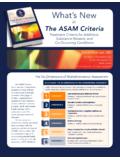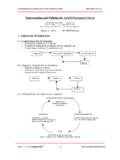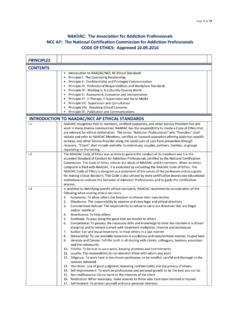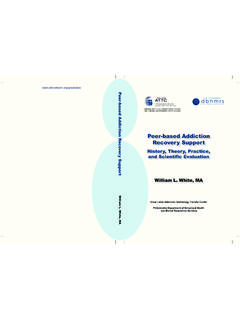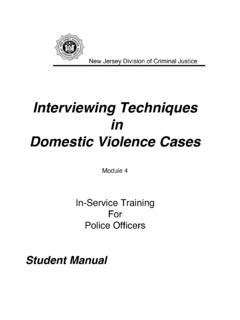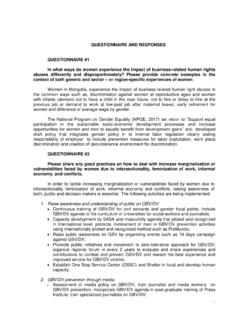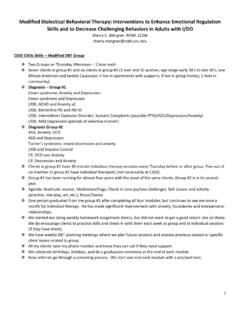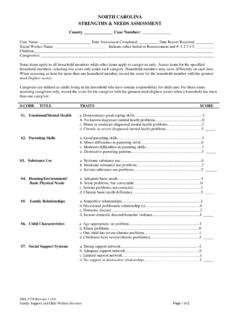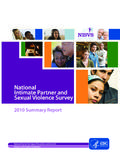Transcription of TREATING MORAL INJURY
1 TREATING MORAL INJURY Cardwell C. Nuckols, PhD MORAL INJURY Dangerous combat and operational experiences such as life threats that elicit fear and hyperarousal are not the only sources of psychic INJURY during warfare MORAL INJURY They have seen the darkness within them and within the world, and it weighs heavily upon them. I would bet anything, that if we had the wherewithal to do this kind of research we d find that MORAL INJURY underlies veteran homelessness, criminal behavior, suicide. Retired Navy Psychiatrist NEUROBIOLOGY OF MORAL BEHAVIOR Neuromoral network for responding to a MORAL dilemma Centered in the right ventromedial prefrontal cortex and its connections Neurobiological evidence indicates the existence of automatic prosocial mechanisms for identification with others that is a part of the MORAL brain PREFRONTAL CORTEX MORAL INJURY AND PTSD PTSD BOTH MORAL INJURY STARTLE REFLEX MEMORY LOSS FEAR FLASHBACKS ANGER DEPRESSION ANXIETY INSOMNIA NIGHTMARES SELF-MEDICATE SORROW GRIEF REGRET SHAME ALIENATION
2 MORAL INJURY AND PTSD Extinction learning is hard-wired Hard-wired to recover from loss Not hard-wired to recovery from MORAL INJURY Difficult to correct core beliefs about a personal defect or a destructive interpersonal or societal response especially when it leads to withdrawal MORAL INJURY AND PTSD Exposure to atrocities does not appear to be associated with hyperarousal symptoms Arousal symptoms stem from high sustained fear due to real or perceived threat to life Exposure to atrocities was only related to reexperiencing and avoidance Morally injurious experiences are recalled intrusively and a combination of avoidance and emotional numbing may also be present MORAL INJURY AND PTSD Killing where there is real or perceived threat to one s life regardless of one s role in the act, is a good indicator of chronic PTSD symptoms Also correlated with alcohol abuse.
3 Anger and relationship problems Subjective reactions are important How it is reconciled is key If cannot accommodate or assimilate the event within existing schemas about self and others, guilt will be experienced, as well as, shame and anxiety about the personal consequences (being ridiculed) MORAL INJURY AND PTSD Poor integration leads to lingering psychological distress Individuals with MORAL INJURY may see themselves as immoral, irredeemable and unreparable and may believe the world is immoral MORAL INJURY Manifestations of MORAL INJURY Self-harm Poor self-care Substance abuse Recklessness Self-defeating behaviors Hopelessness MORAL INJURY Manifestations of MORAL INJURY Self-loathing Decreased empathy Preoccupation with internal distress Remorse Self-condemning thoughts --Litz, et al.
4 , 2009; Tangney, et al., 2007; Fisher & Exline, 2006 MORAL INJURY EMOTIONS SHAME is a global evaluation of the self along with behavioral tendencies to avoid and withdraw May be a more integral part of MORAL INJURY SHAME is related to the expectation of negative appraisal by important others Avoidance is not surprising MORAL INJURY EMOTIONS SHAME is visceral Involves the parasympathetic branch of the autonomic nervous system Shutdown for repair, digestion, elimination and storage of chemistry necessary for engagement AVOIDANCE WITHDRAWAL Mediated by endorphins MORAL INJURY If shame is generalized, internalized as a flaw and is enduring, he/she will experience anxiety about being judged Will Reexperiencing, Numbing Withdrawal (avoidance symptoms)
5 Withdrawal undermines corrective actions MORAL INJURY SHAME Associated with a wide variety of psychological problems including depression and PTSD, as well as, physiological changes including an increase in harmful cytokines, proteins that promote inflammation and cortisol Lead individuals to become angry, aggressive and self-defensive MORAL INJURY .. Being able to pull the trigger through muscle memory is not the same as being able to reconcile the act afterward. --Philipps, 2010 MORAL INJURY ..Many veterans were presenting with difficulties that were not sufficiently addressed in the fear and extinction-based frame that underlies exposure.
6 Steinkamp, et al., 2011 MORAL INJURY Clinicians and researchers focus most of their attention on the impact of life-threatening trauma, failing to pay sufficient attention to the impact of events with MORAL and ethical implications. --Litz, et al., 2009 MORAL INJURY We argue that repeated raw exposure to a memory of an act of transgression without a strategic therapeutic frame for corrective and countervailing attributions, appraisals, and without fostering corrective and forgiveness-promoting experiences outside therapy would be counterproductive at best and potentially harmful.
7 --Litz, et al. 2009 MORAL INJURY Be too careful and you could too aggressive and you might not be able to live with yourself. Mistake the foe for a friend, and perhaps a friend for a foe and die inwardly. --Philipps, 2010 MORAL INJURY Perpetrating, failing to prevent, bearing witness to or learning about acts that transgress deeply held MORAL beliefs Betrayal on either a personal or organizational level can act as a precipitant Navy vet case MORAL INJURY Two Categories Perpetration-based Injuries Betrayal-based Injuries MORAL INJURY Perpetration-based Injuries Actual perpetration of acts of unnecessary or capricious violence Or Perceived acts of commission or omission that violate the service members or veterans sense of honor and duty MORAL INJURY Perpetration-based Injuries-Examples
8 Accidental or intentional killing of noncombatants Torture or sadistic killing Indiscriminate aggressive behavior or killing (possibly coupled with killing of civilians) Mutilation of corpses Sexual assault Failure to prevent death to comrades MORAL INJURY Perpetration-based Injuries-Negative Coping Strategies Denial- Self-protective distancing from the significance and meaning of the experience Once the significance breaks through self-protective denial another coping strategy involves letting the incident overly redefine one s self-concept and identity (may lead to shame, guilt and or self-loathing and suicide)
9 MORAL INJURY Perpetration-based Injuries-Negative Coping Strategies Another coping strategy is excessive assimilation of the significance of the event into preexisting schemas and worldview The military is good and just and I am good and just, so what I did must be good and just. Can lead to increased immoral behavior MORAL INJURY Perpetration-based Injuries-Goals To challenge the rigidity of their worldview-although did something bad it is possible to move on To plant seeds and encourage the consideration of other possible interpretations To draw a circle- within the circle is the event and also the positive aspects of self, as well as, future positive actions MORAL INJURY Betrayal-based Injuries Usually involve a leaders behavior and judgment that are capricious.
10 Dangerous and entail unfair mistreatment Violation of MORAL and ethical conduct leading to disastrous consequences often without redress or justice MORAL INJURY Betrayal-based Injuries Soldiers confidence in MORAL authority and MORAL structure is shaken if not obliterated Difficulty forgiving can cause persistent anger and wish for revenge Irritability, blaming and revenge fantasies Ask- Are there things about your experience that you find you cannot forgive others for? MORAL INJURY Betrayal-based Injuries- Goals To start to understand how betrayal affects ability to trust others, believe in institutions and value ideals such as right and wrong To express anger and disappointment Unburden thoughts and feelings of being a helpless victim of another's immorality To accommodate both the immoral behavior of others and the notion of living in a world where this could happen MORAL INJURY Therapist Concerns Develop a knowledge of the exact nature, conditions, issues, environment.

